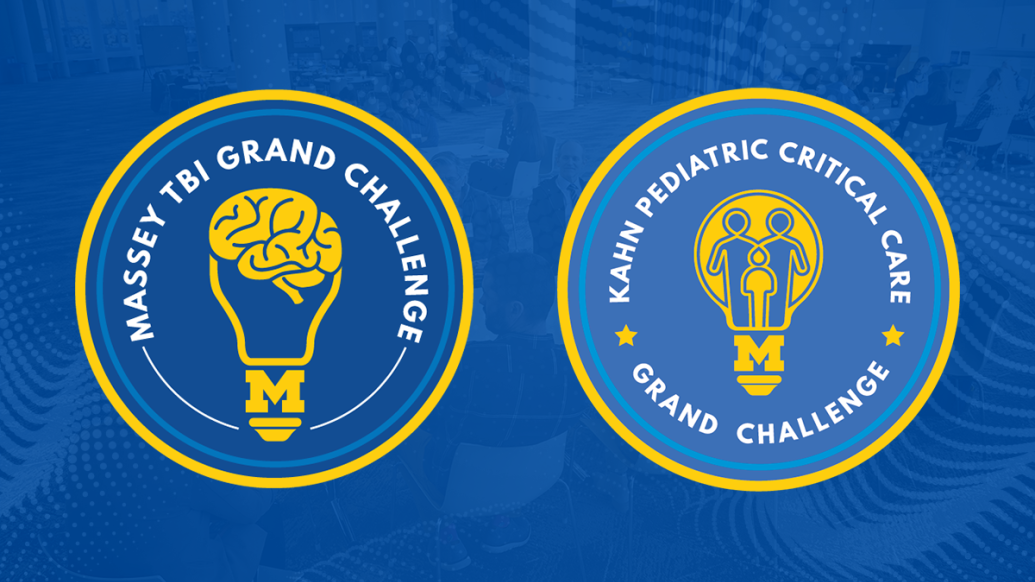The Kahn Pediatric Critical Care and Massey TBI Grand Challenge programs funded 10 multidisciplinary teams in 2024.

ANN ARBOR – The University of Michigan Max Harry Weil Institute for Critical Care Research and Innovation announced today the winners of its 2024 Kahn Pediatric Critical Care and Massey Traumatic Brain Injury (TBI) Grand Challenge programs. Ten multidisciplinary teams were selected to be funded this year, resulting in a total of $1.1 million in research support provided across both programs.
Held annually, Weil Institute Grand Challenges are unique funding mechanisms that support early-stage, high-risk research projects and innovations. The events span multiple months, beginning with an informational kickoff session and two rounds of proposal submissions before culminating in the “Wolverine Den” pitch day competition. At every stage of the process, participating teams have access to valuable feedback from field and industry experts, and specialists in proposal development and product commercialization, which they can then apply to improve their work for the Grand Challenge, as well as future funding applications.
Ultimately, the support provided by the Weil Institute Grand Challenges serves as a springboard that enables all teams—even those who do not receive funding—to reach pivotal next steps in their journey to a groundbreaking research discovery or potential bedside application.
Congratulations to this year’s winning teams! The projects, detailed below, span the spectrum of innovation from novel devices to predictive analytics. In keeping with the Weil Institute’s mission for scientific integration and collaboration, the teams also comprise multiple disciplines, uniting physicians with engineers, entrepreneurs, chemists, and more under the shared goal of bridging gaps in how we diagnose, monitor and manage our most gravely ill and injured patients.
The Kahn and Massey Grand Challenges were made possible through the support of philanthropist Mark Kahn and the Joyce and Don Massey Family Foundation, respectively.
2024 Kahn Pediatric Critical Care Grand Challenge Funded Teams
“Clinical Efficacy of a Novel Nasopharyngeal Airway Device Produced with 3D Printing for Children with Cerebral Palsy”
PI: David Zopf, MD, MS; Louise O’Brien, PhD, MSChildren with cerebral palsy, Down syndrome, and other conditions with hypotonic airway collapse struggle to breathe, sometimes working hard for every breath. The project team has developed a non-surgical innovation that stents the airway open, allowing much easier breathing, at times avoiding the need of more complex surgeries. The Kahn Grand Challenge funding will support continued use and assessment of long term benefit for these patients and families in significant need.
“Clinical Implementation and Pilot Randomized Controlled Trial of PICTURE-Pediatric (Predicting Intensive Care Transfers and other UnfoReseen Events)”
PI: Sardar Ansari, PhD; Rodney Daniels, MDThe Data Science Team at the Weil Institute has developed and validated an artificial intelligence model called PICTURE to predict deterioration (death, unplanned ICU transfer or ICU level of care) for pediatric patients on the general medicine wards. During this project, the study team will use human-centered design to create a clinical response for this model that will determine who would respond to the model alerts, when, and how. In addition, they will design a randomized clinical trial to test the effectiveness of the model in improving patient outcomes. Finally, they will conduct a short pilot clinical trial to identify any potential barriers or shortcomings in the clinical response or the clinical trial design. Following this award, the study team will apply for funding to conduct a large scale clinical trial on the model.
“Point-of-Care (POC) Measurement of Blood Vital Signs in Critical Illness/Injury and Transfusion Medicine”
PI: Rodney Daniels, MD; Mark Burns, PhDCoagulation, red blood cell deformability, viscosity and redox potential (oxidative stress) are four key, interrelated properties reflective of blood health. They also affect and can be affected by a wide variety of diseases and conditions ranging from trauma and sepsis, to sickle cell disease and others. In this project, the team will use a novel point-of-care platform to further study and develop unique blood vital signs measurements that will have profound implications in monitoring blood health by evaluating blood function in real time, as well as the quality of blood collected, stored, and supplied for transfusions. The team’s platform could not only provide a profile of the functional health of blood units to be transfused, but also its effect on circulating blood in the recipient, and insight into parameters by which to improve blood function. This is especially important in pediatric patients in whom there is limited blood volume and in whom transfusions could have significant impact on the intravascular environment and the ability to maintain optimal blood function and blood health.
“Expediting Bedside use of a Novel Microfluidics-Based Platform for the Identification of Subphenotypes in Critically Ill Pediatric Patients”
PI: Heidi Flori, MD; Mary Dahmer, PhD; Katsuo Kurabayashi, PhD;Acute respiratory failure (ARF) is the number one diagnosis associated with pediatric intensive care unit (PICU) admission. The most critically ill subset of children with ARF are those with Pediatric Acute Respiratory Distress Syndrome (PARDS). Currently, no pharmacologic treatment has proven effective in decreasing mortality or morbidity in children or adults with PARDS. Previously, Drs. Dahmer and Flori used a novel microarray platform developed in Dr. Kurabayashi’s laboratory to successfully identify two subphenotypes in children with PARDS and/or ARF that can be distinguished by levels of three inflammatory cytokines with great accuracy. This year, the team aims to validate a) the use of the platform to rapidly assay the previously identified biomarkers; and b) the assignment of patients to the two sub-phenotypes. The team also seeks to make the technology available for bedside use and to implement and test it for real-time use in the pediatric intensive care unit (PICU).
2024 Massey TBI Grand Challenge Funded Teams
“Acoustic Ocular Resonance Assessment as a Measure of Intracranial Pressure”
PI: Kenn Oldham, PhD; Kevin Ward, MDThe goal of this work is to perform proof-of-concept testing of the use of ocular acoustic resonance as a candidate non-invasive method for estimation or classification of intracranial pressure (ICP). The team hypothesizes that increased ICP can be associated with changes in the frequency response of eye vibration, detected by a motion sensor placed on the closed eyelid, and describe preliminary data that may support this hypothesis. Under the proposed plan of work, we will upgrade a prototype emitter and sensor system for use in a hospital setting, with the goal of collecting human subject data from an initial sample of healthy adults and patients having invasive ICP monitors.
“Nasal Photobiomodulation and Drug Delivery Device For TBI”
PI: David Zopf, MD; Zahra Nourmohammadi, PhD; Kevin Ward, MDTraumatic brain injury presents time sensitive needs for rapid delivery of effective therapeutics. Two potential therapeutics include photobiomodulation, or light therapy, and intranasal drug delivery. The team's novel device has been designed to facilitate rapid and simple nasal delivery of both therapeutics in an area where the cranial bones are the thinnest, allowing optimal delivery.
“Development of an Ultrasound-based Flow-pressure Index for the Assessment of Cerebral Autoregulation”
PI: J. Brian Fowlkes, PhDAfter TBI, the vasculature can lose its ability to autoregulate blood flow to the brain. This loss of cerebral autoregulation (CA) is a major determinant of outcome after TBI. However, measuring CA is extremely difficult with the “gold standard,” requiring placement of an intracranial pressure monitor as well as the need for continuous mean arterial pressure (MAP) monitoring. The project team proposes to develop an alternative to PRx by replacing ICP as the measured variable with either internal carotid artery flow (ICA) or middle cerebral artery flow (MCA), combining one of these with MAP or peripheral blood flow to develop an index that is analogous to the invasive clinical standard.
“Continuous Cerebral Blood Flow Monitoring Based on Multimodal Hemodynamic Waveforms”
PI: Kenn Oldham, PhD; Hakam Tiba, MDDue to its interconnected structure, changes in blood flow at any point in the body will produce small fluctuations in pressure at the body's periphery. This effect is small, but a highly sensitive wearable sensor developed at the University of Michigan has shown promise for detecting these small changes. The goal of this project is to extract information about blood flow to the brain using this sensor. The team hypothesizes that the data they collect could be used to infer changes in blood flow to the brain. If successful, this approach would produce a tool for continuous tracking of blood flow to the brain, to aid in selection of treatments to minimize damage following traumatic brain injury.
“Neuroprotection with Evaporative Nasopharyngeal Cooling After Traumatic Brain Injury”
PI: Robert Neumar, MD, PhD; Thomas Sanderson, PhD; Joseph Wider; PhDTraumatic brain injury is divided into multiple phases. The primary injury phase of TBI is caused by mechanical stress applied to the tissue and causes irreversible damage. In contrast, secondary injury progresses over the following hours, providing an opportunity to save damaged tissue and reduce brain injury. The team proposes to test a new therapeutic technology to rapidly cool the brain early during the secondary phase of injury to reduce overall brain damage. The team will cool the brain in a large animal model following TBI to test and optimize rapid brain cooling as a potential therapy for TBI.
“Bispecific Antibody Shuttles for Non-Invasive, Molecular Imaging of Neuroinflammation After TBI”
PI: Colin F. Greineder, MD, PhD; Peter M. Tessier, PhDNeuroinflammation is an important part of the response to TBI and a key target for therapeutic intervention. The team aims to create a non-invasive means of imaging neuroinflammation using a bispecific antibody shuttle, which crosses the blood brain barrier and engages immune cells that have migrated into the brain. With the Massey funding, the team will demonstrate the use of the shuttle in experimental TBI and optimize it for PET (positron emission tomography) imaging. Finally, the team we will conduct a pilot PET imaging study in mice after TBI, generating proof-of-concept data to motivate future large animal and human trials.
Contact:
Katelyn Murphy
Marketing Communications Specialist, Weil Institute
mukately@med.umich.edu




